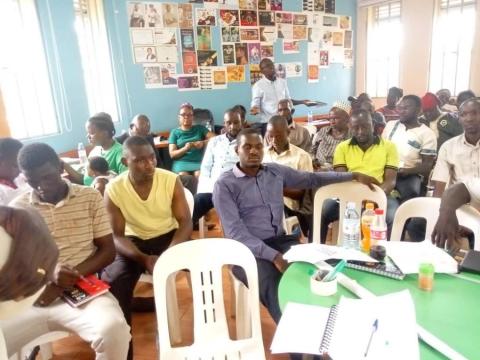
Mr. Lutaya Brighton (a KCCA official) has urged host communities in makindye division to appreciate and embrace refugees despite their socio-cultural differences. “There are refugees who could be very useful to the nation but need slight assistance”, he added. He made these remarkes while officiating at the “Refugee Policy, Rights & Responsibility Awareness Training to Re: Build Partners” organised by Platform for Vendors (PLAVU) with support from the International Rescue Committee (IRC) / IKEA Foundation under the Re: Build programme partnership.
The training that took place at the Youth Social Centre in Kabalagala (Makindye Division) aimed at imparting awareness skills in the area of understanding and enforcing refugees policies, rights and responsibilities to local leadership where refugees live and provide a vital space for discussion of urban refugee self-reliance. In attendance were selected village local Council leaders (LC1) and stakeholders, particularly selected refugees, leaders of RLOs, representatives for vendors and host community opinion leaders in the areas with most urban refugees in Makindye division.
One male refugee participants asked Brighton why refugees are asked for money whenever they apply for refugee identification. Although Brighton could not deny this claim, he could not directly respond to it. He said that it could be true but not many refugees could come out openly to disclose this for fear of the after effects. He warned that ‘short cuts’ are too expensive. The proper procedure is lengthy (bureaucratic) but very cheap and the most appropriate. “Please follow that”, he added.
In his introductory remarks, Mr. Moses Odokonyero (from IRC) revealed that, “today, 60% of all refugees globally live in cities. In Kampala alone, there are 139, 208 asylum seekers and refugees. 84,734 are confirmed refugees”. “60% of these are women, elderly are 1% and the number is highly increasing”, he continued. That means, partners need to begin planning and rethinking their programmes to accommodate this highly growing development need. Moses said that because anyone can become a refugee, we should all act humanely towards refugees. “We need to support them to access employment by writing for them recommendation letters”, he said.
For more highlights from the activity, the detailed actiivty report can be obtained from the PLAVU office.
